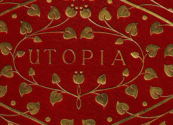Secondary Source for Isle of Pines
by Stephen Spencer
Carey, Daniel. “Henry Neville’s The Isle of Pines: From Sexual Utopia to Political Dystopia.” New Worlds Reflected: Travel and Utopia in the Early Modern Period. Chloe Houston, ed. Farnham: Ashgate Publishing Ltd., 2010. 203-218.
Like many readers of The Isle of Pines (both contemporary and modern), Carey is interested in discerning whether the text is a satire of polygamy and patriarchy, or, a utopian vision of an ideal society. To this effect, Carey finds political readings to be the most useful; as a response to seventeenth-century patriarchal political theory, the narrative of The Isle of Pines “expose[s] the inadequacy of patriarchy to the political requirements of the island’s burgeoning community” (206). Carey believes that Neville fills this gap, in a manner of speaking, thirteen years after the appearance of The Isle of Pines with Plato Redivivus, his own work of political theory. Looking at this text, he suggests, explains why The Isle of Pines turns from a seeming utopia into a dystopia.
The beginning of the text is utopian, Carey believes, but it is satirically so. The story of George Pine and his four wives, procreating in harmonious cooperation with the island’s sole man, “raises patriarchy to the level of fantasy” (208). It recalls the golden age, as described by Ovid in the Metamorphoses and later by Shakespeare in The Tempest. This fantasy dissipates as Henry Pine, the island’s second ruler, faces sexual anarchy and the new phenomenon of non-consensual sexual relations (211). In response, Henry lays down a series of laws based on Mosaic precedent, policing not only sexual activity, but social and religious activity as well. At the beginning of The Isle of Pines, sex is a satiric fantasy; by the end, sex causes chaos and, ultimately, the need for a strong ruler, strong to the extent that he wields the law.
Carey ends the article by turning to the question of the political. In his reading of Plato Redivivus, Carey highlights Neville’s negative view of monarchy, which, he believed, was likely a corruption of a more effective form of governance. Moral deprivation, then, results from weak governance, and it is not surprising that Carey concludes that The Isle of Pines is an intermediary text between monarchical and republican political organization (214). This explains why the Dutch serve as worshipers and saviors of William Pine, the island’s third sovereign. Anglo-Dutch relations slowly deteriorated throughout the seventeenth century, in part, because the Dutch revealed themselves to be royalists. Hence, it is not surprising to see the royalist Dutch supporting the island’s king (215-16). This reading, however, is not to support monarchy; indeed, Neville suggests that the insurrections occurring in William’s reign will be reoccurring nightmares.
Carey’s historical/political reading is strong and covers a lot of the same ground in the special issue we read for this week. Still, I feel there is more to the story. Carey sees the succession of power as causing weak governance and wanton sexuality, which Henry regulates through the Mosaic constitution. If we are looking for causal relationships between the text’s move from sexual harmony t0 sexual discord, from utopian fantasy to dystopian free-for-all, population growth is another big possibility. This plays into The Isle of Pine‘s engagement with discourses of “the natural.” Man is naturally depraved, William says, inclined to fall back to their passions and live in a state of warfare. This is bound to happen as the Pines, Englishes, Sparks, and Phils expand throughout the island. Carey is quite right to negate the racial reading of the text — that the descendants of Philippa (or, the mixed black/white race) are the cause of the island’s moral deprivation. Still, the text seems to harp on the Phils as the instigators of violence, both sexual and martial. If Neville was as committed to republicanism as Carey suggests, then notions of class become that much more important, given that a larger body of the citizenry would be relied upon to serve in political organization. A version of natural law, then, becomes tantamount to political stability — those who can control natural proclivities towards chaos will prove more effective. The Phils, the only family that is really “racialized” in this text, are shown as being recurrently prone to falling back to their animalistic nature. Neville’s version of republicanism, then, is still hierarchical — perhaps it merely substitutes race for patriarchy in its political theory.


